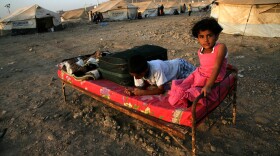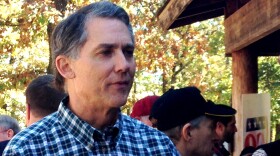Both candidates in the Arkansas Republican primary for US Senate back a bill temporarily stopping the US taking in Syrian and Iraqi refugees while an additional layer of vetting is implemented. Businessman Curtis Coleman and Senator John Boozman support more refugee scrutiny but are unsure of how many asylum seekers to admit once the new inspection process is underway. Both spoke with KUAR following last week’s House vote on the SAFE Act. It’s now headed to the Senate.
Coleman, who garnered 27 percent of the vote in a failed primary bid for governor in 2014, responded to a question about President Obama’s plan to admit 10,000 Syrian refugees in two years by saying, “given the nature of this situation and the place from which these refugees will be coming, 10,000 certainly would be a cap and a ceiling.”
He later said there are too many unknowns to put a number on how many Syrian refugees the US should plan to take if the SAFE Act becomes law.
“It’s hard to put a number on it because I don’t know the magnitude of the number of refugees coming out of Syria,” said Coleman, “ I don’t think anybody really knows that nor can we possibly know that over the next two years. How do we put a cap on that number at this point?”
Boozman is critical of the President’s decision but declined to offer a refugee goal of his own. Like Coleman he stated an uncertain future prevented a decision on how many refugees from war torn Syria and Iraq should be admitted to the US.
“I really wouldn’t speculate. Who knows what’s going to happen in the next year, year and a half,” said the state’s senior US Senator.
Both candidates share an uncertainty over the effectiveness of vetting and the capacity of the national security system to admit larger numbers of refugees. The conflict in Syria has been waged since 2011. The US has admitted less than 2,000 Syrians in the last two years and tens of thousands of Iraqis since 2003. The screening process currently takes 18 to 24 months.
Following terrorist attacks in Paris the president of France announced the nation would continue plans to take 30,000 Syrian refugees. Germany is phasing in 800,000 over several years. All of the radical Islamist plotters have been identified as European nationals so far. Boozman noted that to him visa and passports security issues loom just as large as refugee vetting. He and Coleman both want Middle East nations to take in more refugees.
1.9 million Syrian refugees are registered in Turkey, 1.1 million in Lebanon, Jordan 630,000, Iraq has a quarter million Syrian refugees (in addition to producing its own refugees), and Egypt has taken over 132,000, according to a UN report in September. Saudi Arabia has taken none. The US admitted less than 200 Syrian refugees in October and only one Syrian has ever been placed in Arkansas. He no longer resides in the state.
Boozman said concerns of national security should not be interpreted as a slight against Islam.
KAUFFMAN: There is some rhetoric that is just generally anti-Islam. Most recently Donald Trump floating the idea of closing mosques in parts of the United States, Ted Cruz and Jeb Bush have entertained the idea that only Christian Syrian refugees are welcome in America. Do you think that creates a dangerous environment for people in Arkansas who are Muslim? Do you think there’s a place for that kind of dialogue?
BOOZMAN: I can’t speak for others but my concern is about national security. The United States has been a very accepting country, we don’t have religious tests. The last thing I worry about is where a person’s from or their religious affiliation as we discuss whatever we’re discussing whether its politics or business. That’s a very healthy situation.
Coleman also rejected those who are suspect of people who are Muslim.
KAUFFMAN: There’s a lot of anti-Islam rhetoric. You’ve mentioned din your press conference the other day you want to ride the wave of Trump and Cruz. Trump is in some hot water saying Muslims should maybe be registered in the United States. Cruz has said on Christian refugees should be allowed in. Where do you stand on anti-Islam rhetoric?
COLEMAN: I don’t recall ever saying I wanted to ride the wave of Trump and Cruz.
KAUFFMAN: I guess that was [Zachary] Werrel saying that. (At a Nov. 18 press conference the Coleman advisor said “We hope to ride the wave that’s propelling Donald Trump, Carson, Cruz all these outsiders.”)
COLEMAN: That wasn’t me and I don’t remember that statement being made, not doubting that it was. I think we need to be humanitarian to people who are authentic refugees I wouldn’t put an ideological cast on that humanitarianism and compassion.
President Obama has indicated he may veto the SAFE Act if it comes across his desk.





